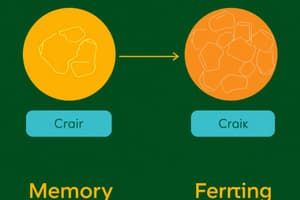Podcast
Questions and Answers
What are the seven sins of memory?
What are the seven sins of memory?
The seven sins of memory include transience, blocking, absentmindedness, persistence, misattribution, bias, and suggestibility.
What is transience, blocking, and absentmindedness?
What is transience, blocking, and absentmindedness?
Transience is memory decay over time, blocking is retrieval failure, and absentmindedness is inattentive encoding.
What is the difference between retrograde and anterograde amnesia?
What is the difference between retrograde and anterograde amnesia?
Retrograde amnesia involves loss of past memories, while anterograde amnesia is the inability to form new memories.
What are the methods to reduce persistence?
What are the methods to reduce persistence?
What is an example of transience/memory decay?
What is an example of transience/memory decay?
What is blocking/retrieval failure?
What is blocking/retrieval failure?
What is absentmindedness/encoding failure?
What is absentmindedness/encoding failure?
What is persistence?
What is persistence?
What is misattribution?
What is misattribution?
What is bias in memory?
What is bias in memory?
What is suggestibility?
What is suggestibility?
What is proactive interference?
What is proactive interference?
What is retroactive interference?
What is retroactive interference?
What can reconsolidation and increasing gene expression through the use of HDAC inhibitors help reduce?
What can reconsolidation and increasing gene expression through the use of HDAC inhibitors help reduce?
What is memory bias?
What is memory bias?
What are flashbulb memories?
What are flashbulb memories?
What is source misattribution?
What is source misattribution?
What are examples of source misattribution?
What are examples of source misattribution?
What is source amnesia?
What is source amnesia?
What is childhood amnesia?
What is childhood amnesia?
What is cryptomnesia?
What is cryptomnesia?
What is suggestibility?
What is suggestibility?
What are the factors that contribute to errors in eyewitness testimony?
What are the factors that contribute to errors in eyewitness testimony?
How are people susceptible to false memories?
How are people susceptible to false memories?
What are the contemporary views on repressed memories?
What are the contemporary views on repressed memories?
What type of memory distortion is illustrated by buying subliminal messaging products after initially dismissing them?
What type of memory distortion is illustrated by buying subliminal messaging products after initially dismissing them?
False memories are easily implanted even for events that are unlikely to happen.
False memories are easily implanted even for events that are unlikely to happen.
Why is eyewitness testimony so inaccurate?
Why is eyewitness testimony so inaccurate?
Flashcards are hidden until you start studying
Study Notes
Seven Sins of Memory
- Transience, blocking, absentmindedness, and persistence are sins related to forgetting and remembering.
- Misattribution, bias, and suggestibility are sins that represent distortions of memory.
Definitions of Memory Failures
- Transience: Memory decay over time; forgetting the plot of a movie is an example.
- Blocking: Inability to retrieve information temporarily; an example is forgetting someone's name.
- Absentmindedness: Shallow encoding due to lack of attention; forgetting keys or appointments are common examples.
Amnesia Types
- Retrograde Amnesia: Loss of past memories and events.
- Anterograde Amnesia: Inability to store new memories.
Persistence in Memory
- Persistence involves unwanted memories resurfacing; a prominent example is PTSD.
- Emotional events are linked to amygdala activity, affecting memory persistence.
Memory Interference Concepts
- Proactive Interference: Old information hinders the recall of new information.
- Retroactive Interference: New information interferes with the recall of old information.
Reducing Persistence
- Propranolol, an HDAC inhibitor, and extinction during reconsolidation can help reduce persistence of traumatic memories.
Memory Distortions
- Misattribution: Incorrectly assigning a memory to the wrong source.
- Bias: Current knowledge influences the memory of past events, leading to alterations.
- Suggestibility: Memories can be influenced by misleading information.
Eyewitness Testimony
- Errors can stem from confirmation bias, police interview techniques, and difficulties in distinguishing between accurate and inaccurate witnesses.
Memory Formation and False Memories
- Imagining events can lead to confusion between imagined and real memories.
- Children are particularly susceptible to false memories, especially for unusual events.
- Repressed memories are controversial; some believe they resurface in therapy while others argue they may be fabricated.
Additional Memory Concepts
- Source Amnesia: Remembering an event but forgetting its source.
- Cryptomnesia: Recalling an old idea but believing it's new.
- Flashbulb Memories: Vivid memories tied to surprising or important events.
Contemporary Understanding of Memory
- The accuracy of recovered memories during therapy is debated, with concerns that false memories can be implanted by therapists.
- Factors contributing to eyewitness inaccuracies include confirmation bias and flawed investigative techniques.
Memory Distortion Examples
- False Fame Effect: Believing a familiar name indicates fame due to prior exposure.
- False memories can sometimes be hard to implant for highly unusual events.
Studying That Suits You
Use AI to generate personalized quizzes and flashcards to suit your learning preferences.




